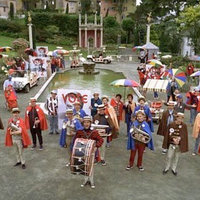
The Village (The Prisoner)
CBUB Wins: 0
CBUB Losses: 0
CBUB Ties: 0
Win Percentage: 0%
Added by: Dinsdale Piranha
Read more about The Village (The Prisoner) at: Wikipedia
Official Site: ITC Entertainment
The Village is the fictional setting of the 1960s UK television series The Prisoner where the main character, Number Six, is held with other former spies and operatives. The theme of the series is his captors' attempts to extract information from him and his attempts to learn the identity of Number One and escape.
Finally, the series finale episode, "Fall Out", strongly suggests that it is located in England near London, and shows a sign for a road which is in Kent. Number Six and other characters are able to drive from the Village (or at least the Degree Absolute interrogation facility which may or may not be attached to The Village) to central London, indicating a location in Great Britain. Although a line of dialogue in "Many Happy Returns" has a character speculating that the Village is on an island, this is never confirmed in the series, and in fact all given locations (save for that in "Fall Out") should be considered unreliable evidence given the fact they are mentioned as part of a deception aimed at getting Number Six to reveal why he resigned from his secret British government job.
The Italianate architecture of the Village is somewhat deceptive as the interiors of the buildings are frequently Georgian, 1960s 'Mod', or in a number of instances, an oddly sparse kind of 'ultra modern' design. Throughout the Village, music plays in the background, nearly all of it alternating between rousing marching band music and lullabies, periodically interrupted by public announcements. The media and signage consistently incorporate sailing and resort themes.
The Village has a logo in the form of a canopied penny-farthing bicycle (commonly referred to as an "Ordinary") which appears on almost everything, including the daily newspaper called the Tally Ho. Exactly who operates the Village is deliberately obscured. Ostensibly, the Village is run by a democratically elected council, with a popularly-elected executive officer known as "Number Two" presiding over it and the Village itself, although internal dialogue indicates that the entire process is rigged. "Work units" or "credits" serve as currency in its shops, and are kept track of with a hole-punched credit card. Although various members of the community in the Village hold down jobs or even own businesses, most, including Number Six appear to be unemployed, and yet can afford a quite comfortable lifestyle, suggesting some form of allowance system of work units to Prisoners.
CBUB Match Record:
No Regular Play Records Available
No Fantasy Draft Records Available
